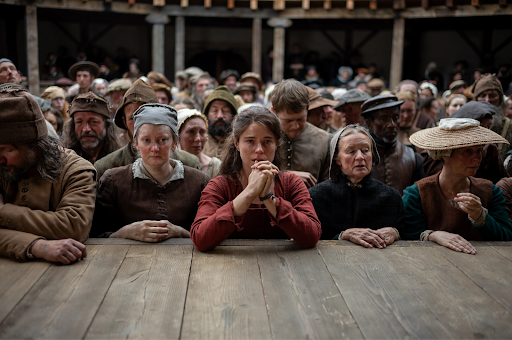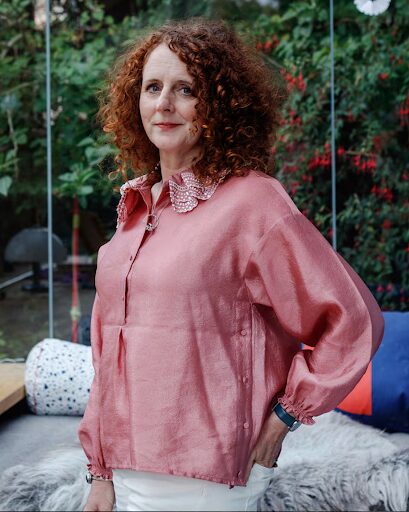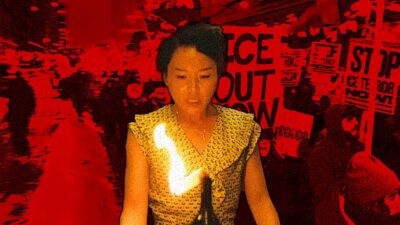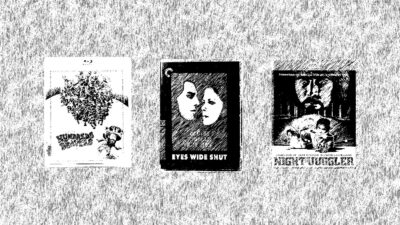Last Saturday, I was lucky enough to be invited to Chevalier’s Books for a Q&A with Hamnet author Maggie O’Farrell and film director Chloé Zhao. Shamefully, this was my first ever event like this at a bookstore, since I’m not nearly as avid a reader as I’d like to be. My perception of Q&As is entirely based on experiences post-film screenings, where you can barely see the talent’s faces as you’re just one of a swarm of hundreds watching. Meanwhile, within the intimate but packed-to-the-brim Chevalier’s, my partner and I walked past Chloé as she nonchalantly moved through the store. At an event full of film people, she would’ve likely been swarmed with people telling her how much they loved NOMADLAND or THE RIDER or, God forbid, asking her to read their script. Here, she moved in total silence. I suspect Maggie is the one who would’ve had the harder time. Indeed, she’s the one who got there second, since she had made three previous stops that day already.
As we sat down waiting for the Q&A to begin, the lights in the store went out. At first, we thought Chevalier’s staff was trying to set the mood or quiet the crowd down, but the entire block had lost power. Zhao quipped that we were now having a period-accurate event, downloading a candle app to set next to the HAMNET film poster for maximum atmosphere as she, O’Farrell, and moderator Dennis Lehane took the stage. In a rare reversal, I got to tell my partner who an author was, as I am all too familiar with the film adaptations of Lehane’s novels (SHUTTER ISLAND, MYSTIC RIVER, GONE BABY GONE). To be clear, I’ve never read a word of his actual writing, but my movie trivia finally came in handy.
This unconventional start led to a Q&A that was unguarded and intimate. It did not feel like two famous people addressing swarms of admirers. We were just a group of people appreciating this work together and learning how it was brought to the silver screen. In preparation, I listened to the audiobook of Hamnet. At first, the stream-of-consciousness, sensory-driven prose was a bit challenging, but I ultimately came to appreciate O’Farrell’s rich deconstruction of William Shakespeare’s family life. As she addressed during the event, her main goal in writing this novel was to reframe the historical narrative around Shakespeare’s wife Agnes (she’s known as Anne Hathaway, but in his will her father named her as Agnes). She’s been disregarded by historians as someone who weighed Shakespeare’s life down with marriage and children, someone who was burdensomely hysterical. An old-fashioned, misogynistic narrative to be sure, and one that Hamnet works overtime to correct. Agnes is portrayed as someone with a debatably mystical connection to the natural world. Someone who takes responsibility for her children while her husband spends most of his time in London building his playwriting empire. The person who sticks around when their son dies of the bubonic plague and tends to the rest of the family. It is a vital work that brings dignity to the footnoted family members of towering historical figures.

O’Farrell brings that same respect to Hamnet, who is also barely spoken about in studies of Shakespeare. Surely, his death was one of the most impactful events in Shakespeare’s life, especially since he named what is perhaps his most iconic work after him. Hamnet portrays Agnes’ experience watching the play as one of initial infiltration leading to deep understanding of her absent husband’s methods of catharsis. It is frustrating, because making art doesn’t materially help the people who are affected, but it also proves just how broken he was by the event.
I haven’t had the chance to see the film, so much of Zhao’s portion of the Q&A was left up to my imagination. She discussed her approach to telling this story, particularly how she envisioned it alongside O’Farrell when they co-wrote the screenplay. She spoke about how her natural instincts to portray emotion without dialogue—leaning into atmosphere and stillness—were a natural fit for a very internal work. They talked about how the nonlinear structure of the book was streamlined in order to make the story flow better for the screen. Stories were shared about location scouting, particularly a deep, black hole in the ground that will become a primary visual symbol of Agnes’ despair. Jessie Buckley was apparently all too eager to sit close to the dangerous void, fully immersed in what I’ve heard is an Oscar-worthy performance. The power also came on halfway through. I had wondered if Hamnet himself had been haunting the event. I suppose he approved of the Q&A.
Afterwards, I had a few minutes to speak with Maggie as the crowd lined up for the book signing. I was nervous since this is my first ever interview with an author, praying that my audio recording would come through as the book lovers chatted around us. Thankfully, it did, and I’m happy with how this short conversation came out.

I heard you at the Edinburgh Writing Festival describe writing fiction as hiding in plain sight. As this novel has gone from stage to screen, have you found that certain aspects of your personal connection to the story have become less hidden?
Maggie O’Farrell: Fiction’s a really effective mask, as it is mostly made up. I think it’s a kind of patchwork of lots of different things, but there are elements of my life, certainly, that do filter into novels. It’s inevitable. But I think that you can still hide. You’ve still got the mask, even if the mask is Jesse Buckley or Paul Mescal.
When you are working with Chloé Zhao and you’re adapting this novel, which stylistic aspects of both of your works allowed you guys to connect the most?
MO: I think something that spoke to Chloé about the book was the connection with the natural world. I think that’s something that maybe we both see in each other’s work. I think Chloé is very brilliant at making a kind of correlation between somebody’s inner landscape and the outer landscape. So in a lot of her films, including THE RIDER and NOMADLAND, and in this film as well, to an extent, I think she often features characters who are unable to connect with their feelings inside, and so they sublimate their thoughts and feelings into the landscape around them. I think she is the best in the business at conveying that on screen.
Sitting with grief is a very powerful internal process, and I think in cinematic and written mediums, those experiences are represented differently. I was wondering how you think both forms navigate expressing that for these characters?
MO: I think that if you’re going to make a film or write a novel about the death of a child, it’s always going to be in some ways a difficult thing to connect or interact with. It is always going to be upsetting. One of the reasons behind me writing the book was that I wanted people to understand that Hamnet had existed and he was important, and we owe him so much. You know, without him, we wouldn’t have the play Hamlet. And I was always really saddened by the fact that not many people knew about him, that he’s just a footnote in his father’s story. I wanted his death to feel like a huge event. I wanted more people to know his name. So the fact that Chloé has taken the book and made a film and now his name’s going to be on billboards makes me really happy.
I’ve heard you talk about how Hamnet’s story “reached out to you” in a sense when you were researching Shakespeare. Do you find when you’re researching historical figures that those unsung names reach out to you a lot? Do you think that historians and biographers could do a better job of pointing out those more unsung family members?
MO: I wouldn’t presume to criticize Shakespeare scholars. I think they’ve done an incredible detective job of picking up all these little, tiny things about his life and these tiny documents, which, surprisingly, aren’t actually that many, surprisingly for him. As a novelist, you look for gaps in a story. You look for the shadows behind the main character in a sense, and it’s always that which draws me, because wherever there’s a gap or a vacancy in a kind of known story, that’s where a novelist can step forward and fill it with whatever story they want to tell.
Do you think that you would ever take on writing a biography?
MO: I think I’d be really bad at it. I find the truth hard to stick to. I much prefer to make things up.
I’ve heard you talk also about how you don’t name Shakespeare in the book because you don’t want people to project their image of Shakespeare onto him as they’re reading. I was curious, as this has gone to be a play and now a movie, when there is, like, a physical person playing him, do you at all worry that, like, those projections are going to circle back in?
MO: No, I mean, I think the, one of the really unique things about Shakespeare is that everybody has their own Shakespeare inside their head. Everybody has a version of him that they are, um, loyal to, and then that’s fine. You know, my version of Shakespeare is going to be different from yours or anyone else’s here, and that’s okay. And the reason why I didn’t name him in the book is that I think his name is quite distracting in print for readers. You know, I found that I couldn’t write a sentence saying you know, “William Shakespeare walked up the path and knocked on the door.” It just felt ridiculous. I thought, I can’t expect readers to stay in this narrative if I can’t. The book and the film say a lot about names. You know, the fact that Hamnet’s name is so close to Hamlet and people get divorced from their names and they drift off and they start to mean something else. So I found the best way to ask readers to open themselves up to a new interpretation about Shakespeare was just to keep his name off the page.
I saw that Audrey Diwan (2021’s HAPPENING) is taking on The Marriage Portrait, and I was curious if you are taking anything from this experience? Are you co-writing that script or taking anything from this experience into that next one?
MO: I’m quite hands off at that at the moment because Audrey’s writing the script herself. I’m really interested to know, we had a Zoom call last week, I think. We were talking about casting and some changes that she’s made to the ending of the book. I haven’t read the script yet, but I’m looking forward to seeing it.
Chloé Zhao’s adaptation of HAMNET premiered at the 2025 Telluride Film Festival. It is slated for a limited release on November 26th, 2025, and is set for wide release on December 12th.
















Comments